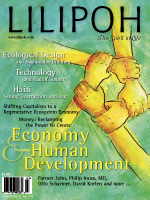Amid Turbulent Economic and Environmental Change Agrarian Initiatives Emerge as Pathways Forward
 By Steven McFadden
By Steven McFadden
When the UN’s Millennium Project released their State of the Future study last year—based on the input of 2,700 researchers, and backed by UNESCO, the World Bank, and the US Army—it set out an appallingly grim vision of what lies ahead. The study foresaw shortages of food and goods, a harsh reality that would incite widespread violence and potentially provoke much of civilization to collapse.
After reading that report I felt as if I'd just received an invitation to the dungeon of despair. But then, as if on cue, I met Joanne Shenandoah, the gifted Oneida singer and song writer. I heard her give voice to "Prophecy Song"—a musical empowerment for the ages which can be experienced on youtube.com, as well as on her CDs.
We are now reminded
to be aware of our place upon this earth.
and to fulfill our obligations to ourselves,
our families, our nations,
the natural world, the Creator.
The words sing, we are to awaken.
Stand up, Be counted,
for you are being recognized in the Spirit world.
—Joanne Shenandoah
Her message and her voice anchored me here in a present tense of strength and possibility, and reminded me also of another respected friend from the Native American community, the late Leon Secatero. Formerly the Headman of the Canoncito Band of Navajo, To’Hajiilee, New Mexico, Leon had the gift of insight. Whenever he would hear pronouncements of doom, he would acknowledge the potential, then respond calmly.
“The journey we are beginning now is for the next 500 years," he told me one day. "What will be the sacred path that people will walk over the next 500 years? Even in the midst of all the changes taking place and all the things falling apart, we are building that foundation now. That’s something important for us to remember and to focus on. If we don’t do it, no one else will.
“We need to take a close look at this and then really come to terms with ourselves,” Grandfather Leon said. “To move ahead into the next 500 years we must leave some things behind or they will contaminate or even eliminate the future. We cannot go forward if we keep destroying the earth. But we must also ask, what is good and healthy and helpful? Those good things can be part of our foundation, part of our pathway into the next 500 years."
As the economic and natural worlds continue to mutate rapidly around us in 2010, I reflect on Leon's questions, and immediately what comes into focused response are the thousands of healthy initiatives arising in the realm of clean farms and clean food. They are good and healthy and helpful.
I have come to think of the people involved with these initiatives as the Millennial Agrarians. There is a burgeoning movement in which these agrarians—representing a wide range of ages, ethnicities, and backgrounds—are taking up one of the world’s oldest professions: organic farming. For these new farmers and gardeners, going to the land is not an escape from the conventional world, but an active embrace of plants, animals, people and the future.
In the face of the grim vision described by the State of the Future researchers, these Millennial Agrarians are a living embodiment of hope. They know their work is making a definite difference in the health of the planet, and in the physical and mental health of the people. We are going to need a lot of these new agrarians—millions more—to face what is happening in our world, and to respond intelligently and effectively to the urgent call of the land. But the potential is there, and the Millennial Agrarians are demonstrating the workable models and pathways that others can follow.
Starting in the late 1980s, Community Supported Agriculture (CSA) emerged as one of the initial agrarian waves of response to our sickening planet and our corrupted food supply. But many variations on CSA, and many related agrarian initiatives have come forward since then: urban agriculture, thousands of school gardens, hundreds of farm-to-school projects, municipal composting programs, and an increasingly popular amenity being offered to residents of new subdivisions: a working farm at the heart of the housing cluster, part of set-aside open space—several hundred projects like this are underway or being planned across the country. The positive, proactive initiatives just keep coming forward as more and more people grasp the reality of our environment and our economy, and as they awaken, stand up, and choose to become involved.
These agrarian initiatives are an authentic hope for the present and the future. They establish oases of radiant environmental health upon the land, they yield clean, fresh food for the health of our bodies and our minds, and they create opportunities for dignified and meaningful work in nature. Collectively, the Millennial Agrarians are establishing a foundation upon the land for the high-tech digital culture which is emerging so dynamically in our world.
Steven McFadden is co-author of Farms of Tomorrow (1991), America’s first book on Community Supported Agriculture (CSA). The volume helped inspire the movement to grow from two farms in the late 1980s to thousands, with hundreds of thousands of shareholders, in 2010. Steven also coauthored the second book about CSAs -- Farms of Tomorrow Revisited (1998). His newest book—The Call of the Land: An Agrarian Primer for the 21st Century—was named among the best books of 2009 by The Food Systems Network NYC. He is also the author of several other nonfiction titles, including Profiles in Wisdom, Legend of the Rainbow Warriors, and Odyssey of the 8th Fire. His web site is www.thecalloftheland.com
